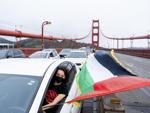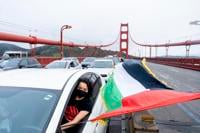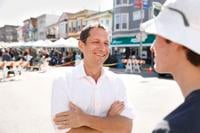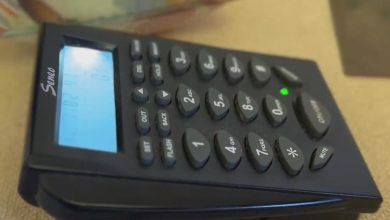Faith and psychedelics collide in San Francisco church buildings | Enterprise
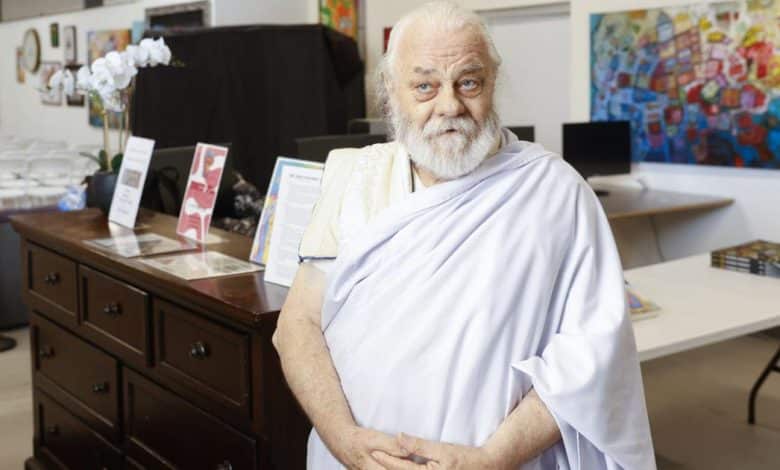
In a stark white-and-concrete studio space in SoMa on Monday evening, psilocybin enthusiasts had the opportunity to sit down with Dave Hodges, the founder of Zide Door in Oakland and the Church of Ambrosia in San Francisco, and learn at his feet.
“Be prepared that that thing that’s taking control of you is actually your soul,” said Hodges to one young man who told the psychedelic spiritual guru he felt anxiety and panic after consuming a larger dose.
Gathered in a loose semicircle on folding chairs around Hodges on a purple couch, roughly a dozen people asked questions related to their trips, dosages and other psychedelic substances.
“One of the things that is definitely true with all the doses is intention is really important,” Hodges told another man, who reported feeling “drunk” and “giggly” after consuming some Cambodian mushrooms.
Monday marked the Church of Ambrosia’s first anniversary in San Francisco. The magic-mushroom church isn’t a nonprofit. Instead, it operates as a spiritual space and a psychedelic business run out of a two-story historic building at 1121 Howard St.
The first floor is an art studio with colorful, psychedelic paintings hung on white walls, while the second is where people are provided with “sacrament” — or mushroom doses — in exchange for donations.
As interest in psychedelics grows throughout the country, some San Francisco organizations such as the Church of Ambrosia are blurring the lines between First Amendment freedoms and the regulation of federally controlled substances — and helping to perpetuate a growing acceptance of psychedelics in religious settings and healthcare.
For one Church of Ambrosia member, Lindsay Rucker, the cozy atmosphere of the church’s second floor was a huge draw.

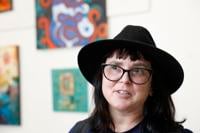
Lindsay Rucker came to the Church of Ambrosia first anniversary celebration of the Church’s Zide Door at 1121 Howard Street in San Francisco on Monday, April 15, 2024.
Craig Lee/The Examiner
“It’s more private, and each person has their own station for individual consultations,” said Lindsay Rucker, who first joined the church in Oakland before visiting the San Francisco location.
Rucker said she became interested in psychedelics during her work as a substance-use counselor in Novato. While studying for her master’s in social work, she discovered the church. As a spiritual person her whole life, it felt like a natural fit.
“It connects you to what the meaning of life is and gives me interest in what it is that makes me happy,” she said.
She’s not the only one. The church now has more than 100,000 congregants between the two locations, Hodges told The Examiner. They are accepted on a membership basis through a questionnaire and can receive mushroom doses during the churches’ operating hours.
While the Church of Ambrosia might be more well-known, it’s hardly the only one in San Francisco. At least two other established churches — the Living Church in Lower Nob Hill and the Church of Cosmic Consciousness in the Castro — offer psychedelic mushrooms as a sacrament in exchange for donations in The City.
All three opened their doors in the last year or so, though not all adhere to the same definition of a church.
The Living Church in Lower Nob Hill, for example, looks more like an average storefront, albeit without any outside signage indicating what’s inside. Those who enter are required to sign waivers. The owner of the Living Church declined to comment for this story, while Jade, the owner of the Church of Cosmic Consciousness, initially agreed to speak with The Examiner but later ceased communication.
Hodges, no stranger to the media, has been outspoken about his church’s activities and beliefs since the Oakland Police Department raided his Oakland location in August 2020, seizing some $200,000 worth of mushrooms, cannabis and cash.
The department reportedly acted on a tip from the Alameda County Health Department alleging the illegal business was “creating respiratory health issues” for children nearby.
He reopened the church not long after but has come up against the city of Oakland over a special use permit to be a church at 1216 10th Ave. location due to zoning.
“Administrative land-use issues are stuff that we’ve dealt with in Oakland and are also dealing with in San Francisco,” he said.
The San Francisco Planning Department and the Department of Building Inspection have cited the church over complaints regarding changes to the building’s interior and a safety violation related to a sliding glass patio door on the second floor that the planning department said posed a fall hazard.
Hodges said he’s actively working on resolving the issues but, in the meantime, hasn’t experienced any pushback from law enforcement, which he said is likely due to changing attitudes and that San Francisco and Oakland have effectively decriminalized the possession of psychedelic mushrooms.
“There’s a lot that’s becoming more and more accepted all throughout the Bay Area and really all throughout the nation,” he said.
But unfortunately, he said, these changes aren’t helpful if mushrooms remain illegal under federal law.
“It’s complicated, to say the least,” he said.
The ability of churches to provide this substance is still somewhat of a legal gray area, despite a Supreme Court legal case setting a precedent in 1990. Employment Division, Department of Human Resources of Oregon v. Smith was a case that involved two men who were fired from their jobs due to using peyote in a Native American religious rite. The court determined that the First Amendment did not protect individuals from ingesting illegal substances as part of their religion.
“You have a right to free exercise of your religious belief, but that doesn’t mean that you have a right to do things that violate the law,” said Radhika Rao, a constitutional law expert with UC Law San Francisco.

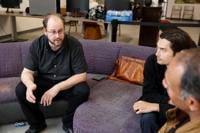
Pastor Dave Hodges (far left) of the Church of Ambrosia, speaking with Raff Poole (center) and Arun Sivanandam who both came to the first anniversary celebration of the Church’s Zide Door at 1121 Howard Street in San Francisco on Monday, April 15, 2024.
Craig Lee/The Examiner
However, she said, the court has been more protective of individual religious liberty recently, which has bumped up against the 1990 ruling. For instance, during the COVID-19 pandemic, when states closed all businesses that were not deemed essential, the Court determined that churches should be allowed to stay open.
“This is an area of law that’s kind of been in flux recently,” Rao said.
But, she added, this still likely wouldn’t protect the mushroom churches if they were challenged, as the 1990 case still stands.
“There are exceptions within the laws for certain things, but not for religion,” said Rao. “Then, under our current Supreme Court, maybe you have an argument that your religion is being discriminated against.”
While this is unlikely to change on a national level any time soon, in California at least, some prohibitions could be lifted. A new bill authored by Bay Area state Sen. Scott Wiener and introduced in February is calling for the legalization of supervised, therapeutic psychedelic treatments in the state. This comes after Gov. Gavin Newsom vetoed another bill by Wiener last year that would have decriminalized psychedelics altogether.
The intersection of therapy, religion, and psychedelics already exists for some involved in San Francisco’s mushroom churches, like Rucker. But even for those who follow more traditional ideologies, it’s not an unheard-of combination.
“There’s a great desire that’s existed long before now for a deeper experience of what we can call the spiritual,” said Marc Andrus, the bishop of the Episcopal Diocese of California.
There are many examples already out there, he said, such as chanting, dancing, music — and even sound baths at Grace Cathedral.
“Our services themselves engage the senses, like with music, with vision, with stained glass windows with smell, using incense, with icons,” he said. “All of these ways we’re heightening the normal experience of everyday life and the purpose of that is not for the quality of the experience itself, but rather to open ourselves up to the reality of God.”
Psychedelics, like psilocybin, could be thought of as just another way of adding to the ritual and opening people up, he said.
“While our church and most Christianity does not use psychedelics to achieve that end, we are, broadly speaking, on a path that’s not terribly different from that,” he said.
Andrus said he wouldn’t necessarily try psychedelics, but he knows others who are ordained who have embraced it — even learning how to administer psychedelics as part of their goal to care for people who might be struggling with mental-health issues.
“Licensed therapists are sometimes accompanied by priests or ministers, and they kind of form a therapeutic team,” he said. “These are people representing faith; they are people of faith themselves, but they’re seeking to meet and help people where they are.”
But The City’s mushroom churches have not always provided a safe, healing space for everyone involved. A volunteer for Hodge’s Zide Door church in Oakland told The Examiner that they’ve become disillusioned with the church after working there for the past two years.
“It’s not necessarily all butterflies and flowers,” the volunteer said. “It’s basically a trap house masquerading as a church.”
The volunteer — who asked to remain anonymous due to concerns over retaliation — joined the church because of their traditional Christian background and passion for psilocybin.
“My idea of a church is more of a community and a place where people can build community and be supported,” the volunteer said.
But issues have festered over the last couple of years. The volunteer cited a toxic culture of harassment, out-of-the-blue firings and an overall lack of respect from Hodges himself.
“I don’t have any vendetta against [Hodges],” they said. “It’s just unfortunate and disheartening that he calls himself a pastor, and he calls the space a church, but he’s not even acknowledging the people working at the church.”
Hodges acknowledged the claims of harassment, conceding that there have been incidents in which members have harassed staff or vice versa over the years.
He told The Examiner that the church’s membership requires people to provide their time, money and labor in exchange for sacrament. However, in some cases, this ad hoc membership policy has opened the door to problems.
“The structure of all of that is how we compensate the volunteers,” he said. “There are some volunteers who only get sacrament; there are other volunteers that get some sacrament and some cash and a variation between what they need and how much time they donate to the church.”
With more than 100,000 members in the church, many of whom perform volunteer duties, it can be difficult to keep track of what happens. “It’s staggering the number of people that have come and gone for different reasons over the years,” he said. “There are definitely things that we’ve had to deal with, just like anybody else.”
Despite the issues, the volunteer isn’t planning to leave the church because of a love of the work.
“To get to speak about mushrooms with people who are trying to better their lives, whether that be through microdosing or in large doses,” the volunteer said. “Being able to facilitate that is a blessing in itself.”



